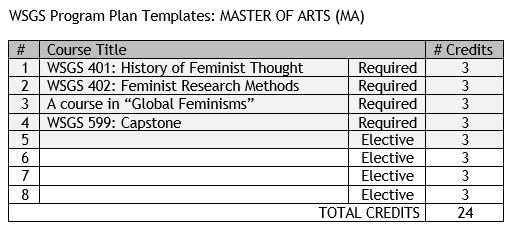Previous Requirements
The requirements listed below are applicable to students entering the program before August 15, 2019.
#1. WSGS 401: History of Feminist Thought
WSGS 401 surveys the historical development of feminist thought from Mary Wollstonecraft to second-wave feminism and analyzes the impact of feminism on the general culture. Offered every fall.
#2. WSGS 402: Feminist Research Methods
WSGS 402 begins with a history of women's education in the United States and traces the institutional and intellectual development of women's studies as a field, focusing on the evolution of women's studies in the academy (here and in other countries) and on the changes in concepts of knowledge, in methodologies, and in pedagogy that women's studies scholarship has produced in various fields.
WSGS 402 also introduces students to archival research using Loyola University's Women and Leadership Archives. Offered every spring.
#3. A course in "Global Feminisms"
The third core requirement is a course that explores feminism in a global dimension; a number of different courses can satisfy this requirement. Offered at least once a year.
#4. WSGS 599: Capstone
As part of the M.A. program, all students must complete a capstone experience of their choice: an internship, a thesis, or a self-designed practicum. Upon completion of the program, all students do a capstone presentation -- reflecting on the culmination of their work in the program as well as future applications of their WSGS curriculum -- at the biannual WSGS capstone ceremony and celebration.
Along with the capstone presentation, students are required to submit a brief synthesis paper and annotated bibliography of ten sources in Women’s Studies and Gender Studies that have been influential to their work.
#5-8. Electives
Some WSGS electives, like Queer Theory, are offered on a yearly basis. Other electives are offered through the departments (including English, History, Philosophy, Sociology, Political Science, Theology, Communications, Law, and Social Work) and vary from semester to semester.



